Document Author
Year Published
- 2015 (9) Apply 2015 filter
- 2014 (5) Apply 2014 filter
- 2012 (4) Apply 2012 filter
- 2017 (4) Apply 2017 filter
- 2005 (3) Apply 2005 filter
- 2000 (2) Apply 2000 filter
- 2002 (2) Apply 2002 filter
- 2004 (2) Apply 2004 filter
- 2007 (2) Apply 2007 filter
- 2013 (2) Apply 2013 filter
- 2016 (2) Apply 2016 filter
- 2008 (1) Apply 2008 filter
- 2009 (1) Apply 2009 filter
- 2011 (1) Apply 2011 filter
- 2018 (1) Apply 2018 filter
- 2020 (1) Apply 2020 filter
Topic
- (-) Remove Plain Language & LEP filter Plain Language & LEP
- Plain Language (27) Apply Plain Language filter
- 100% Access to Justice (12) Apply 100% Access to Justice filter
- Forms (12) Apply Forms filter
- LEP and Access (12) Apply LEP and Access filter
- Forms (9) Apply Forms filter
- Research (8) Apply Research filter
- Self-Help Centers (8) Apply Self-Help Centers filter
- Reports, Evaluations, Best Practices, Surveys (7) Apply Reports, Evaluations, Best Practices, Surveys filter
- State Language Access Plans (7) Apply State Language Access Plans filter
- Trial Court Self-Help (7) Apply Trial Court Self-Help filter
- Simplification (6) Apply Simplification filter
- Strategic Planning (6) Apply Strategic Planning filter
- Best Practices for Self-Help Centers (5) Apply Best Practices for Self-Help Centers filter
- Technology (5) Apply Technology filter
- Ethics Education (4) Apply Ethics Education filter
- Presentations (4) Apply Presentations filter
- Articles & SRLN Briefs (3) Apply Articles & SRLN Briefs filter
- Best Practices (3) Apply Best Practices filter
- Courts (3) Apply Courts filter
- LEP Reports (3) Apply LEP Reports filter
- Libraries (3) Apply Libraries filter
- ATJ Commissions (2) Apply ATJ Commissions filter
- Conferences & Summits (2) Apply Conferences & Summits filter
- Consumer Adoption (2) Apply Consumer Adoption filter
- Judicial Ethics (2) Apply Judicial Ethics filter
- Justice Tech Entrepreneurs (2) Apply Justice Tech Entrepreneurs filter
- Map Gallery (2) Apply Map Gallery filter
- Reports (2) Apply Reports filter
- State-by-State (2) Apply State-by-State filter
- Triage (2) Apply Triage filter
- Unbundling (2) Apply Unbundling filter
- Webinars (2) Apply Webinars filter
- Working Groups (2) Apply Working Groups filter
- Automated Forms & E-Filing (1) Apply Automated Forms & E-Filing filter
- Clerk, Self-Help Center Staff, and Librarian Ethics (1) Apply Clerk, Self-Help Center Staff, and Librarian Ethics filter
- Evaluation (1) Apply Evaluation filter
- Funding (1) Apply Funding filter
- Human Centered Design (1) Apply Human Centered Design filter
- Legal Aid (1) Apply Legal Aid filter
- Trainer of the Trainer Materials / Curricula (1) Apply Trainer of the Trainer Materials / Curricula filter
State
- California (5) Apply California filter
- New York (3) Apply New York filter
- Minnesota (2) Apply Minnesota filter
- Washington (2) Apply Washington filter
- Alaska (1) Apply Alaska filter
- Connecticut (1) Apply Connecticut filter
- Florida (1) Apply Florida filter
- Georgia (1) Apply Georgia filter
- Hawaii (1) Apply Hawaii filter
- Illinois (1) Apply Illinois filter
- Massachusetts (1) Apply Massachusetts filter
- Nebraska (1) Apply Nebraska filter
- North Carolina (1) Apply North Carolina filter
- Rhode Island (1) Apply Rhode Island filter
- South Dakota (1) Apply South Dakota filter
- Texas (1) Apply Texas filter
Region
Tags
Post date
Search results
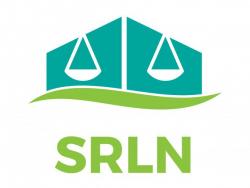
SRLN Brief: LEP Language Access Resources (SRLN 2015)
Without proper language assistance, Limited English Proficient (LEP) court users are excluded from meaningful participation in the courts. Federal laws particularly applicable to language access include Title VI of the Civil Rights Act of 1964, and the Ti ...
Rhode Island Judiciary Provides Equal Access for Individuals with Limited English Proficiency (Rhode Island 2016)
In April 2016, the Rhode Island Justice Department announced the closure of its case concerning the provision of language assistance to individuals with limited English proficiency (LEP) in the state court system following the successful implementation of ...
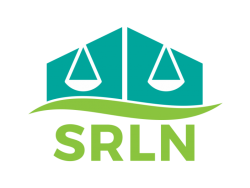
SRLN Brief: Plain Language Resources for 100% Access (SRLN 2015)
What is plain language? As described by the federal government on plainlanguage.gov, plain language is communication your audience can understand the first time they read or hear it. Plain language is recognized as an essential best practice in all access ...
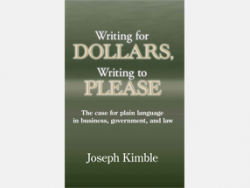
Book: Writing for Dollars, Writing to Please The Case for Plain Language in Business, Government, and Law (Kimble 2012)
This book collects the empirical evidence supporting the value of plain language in business, government, and law. Professor Kimble summarizes 50 studies (no less) that show using plain language can save organizations and agencies a significant amount of ...
Handbook: Write For Your Reader (NWT Literacy Council 2015)
This is an easy-to-use 'how to' manual for people who write or edit reports, memos, minutes, brochures, or other documents. Recommended Citation: NWT Literacy Council, A Plain Language Handbook: Write for your Reader, Department of Education, ...
Resource: Scribes Journal of Legal Writing (American Society of Legal Writers)
The Scribes Journal of Legal Writing is a a scholarly journal which publishes articles about legal writing. It has published articles by many of the best-known figures in legal writing — including Garner, Kimble, Charles Alan Wright, Richard Posner, Lawre ...

Report: Language Access Innovations in Courts (Legal Design Lab 2019)
In a study for the California Judicial Council, Stanford University's Legal Design Lab evaluated how technology, such as the use of tablets and Google Translate, might improve court access for visitors of Limited English Proficiency (LEP). Language A ...
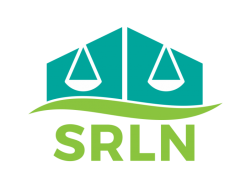
News: Language Access: Key Component for 100% Access (SRLN 2016)
In the last few years, state courts throughout the country have renewed their focus on language access planning and services for limited-English proficient (LEP) users. These efforts have largely occurred in response to the DOJ’s 2010 letter reminding cou ...
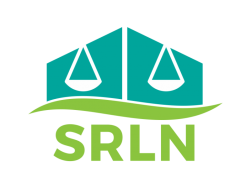
Weblinks: Language Access Bench Cards (Multiple States 2015)
As courts develop language access policies, many are developing bench card to standardize bench officer protocols. Examples of a few follow: Minnesota Bench Card for Courtroom Interpreting Minnesota Bench Card for Video Remote Interpreting in the Courtroo ...
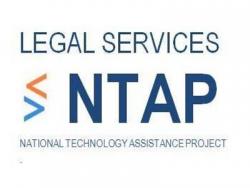
Webinar: Technology Tools to Enhance Legal Services for LEP- Websites, Videos and More (LSNTAP, LSC, ProBonoNet 2014)
In the webinar Technology Tools to Enhance Legal Services for Limited English Proficiency, four panelists (Kathy Daniels, IT Administrator Statewide Legal Services in Connecticut, Rochelle Klempner, Chief Counsel NYS Access to Justice Program, Mike Monaha ...